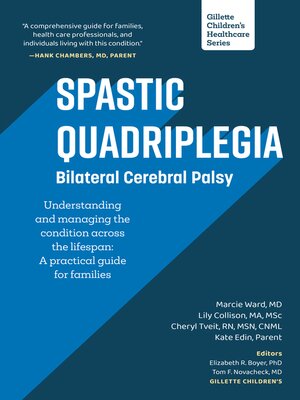Spastic Quadriplegia–Bilateral Cerebral Palsy
ebook ∣ Understanding and managing the condition across the lifespan: A practical guide for families · Gillette Children's Healthcare Series
By Marcie Ward

Sign up to save your library
With an OverDrive account, you can save your favorite libraries for at-a-glance information about availability. Find out more about OverDrive accounts.
Find this title in Libby, the library reading app by OverDrive.



Search for a digital library with this title
Title found at these libraries:
| Library Name | Distance |
|---|---|
| Loading... |
Spastic quadriplegia accounts for about one-fifth of cerebral palsy (CP), and CP itself is the most common cause of childhood-onset physical disability. An estimated 17 million people worldwide have CP. Spastic quadriplegia is also known as bilateral spastic CP or, simply, bilateral CP. Spastic quadriplegia affects all four limbs and the trunk. It is generally a severe form of CP that impacts many aspects of a person's life. This practical guide addresses both the motor and nonmotor aspects of spastic quadriplegia across the lifespan and their treatment. It also includes the lived experience of families.
The writing of Spastic Quadriplegia was led by Marcie Ward, MD, Pediatric Rehabilitation Medicine Physician at Gillette Children's, a world-renowned center of excellence for the treatment of brain, bone, and movement conditions. Spastic Quadriplegia is part of the Gillette Children's Healthcare Series, a series of books for families who are looking for clear, comprehensive information. Health care professionals, educators, students, and extended family members will also benefit from reading Spastic Quadriplegia.
Other titles in the series include:







